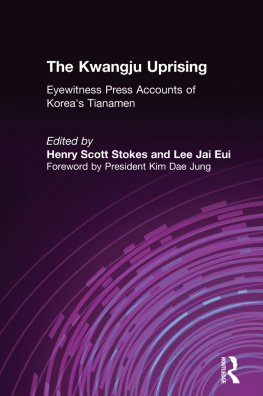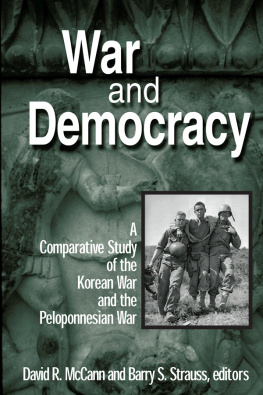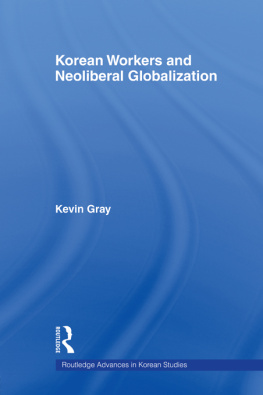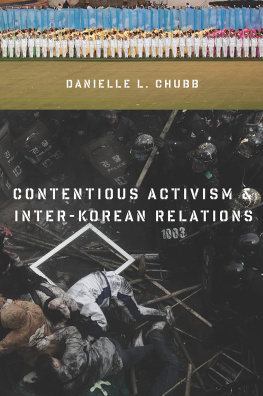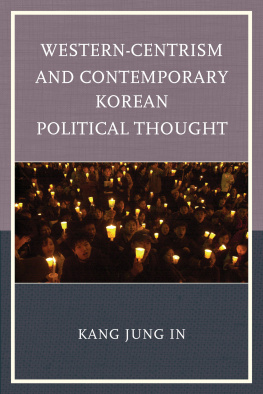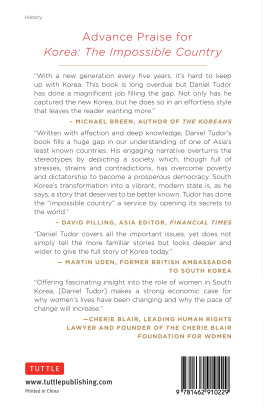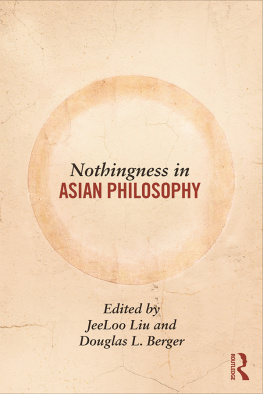The Kwangju Uprising
A Pacific Basin Institute Book
THE PACIFIC BASIN INSTITUTE AT POMONA COLLEGE
Now entering its twentieth year of service, the Pacific Basin Institute at Pomona College remains dedicated to its original goal of furthering intelligent communication between the nations of the Pacific Basin and increasing knowledge among Americans of the cultures, politics and economics of the Asia/Pacific countries.
Since moving to Pomona College in 1997, PBI has greatly extended the scope of its activities. Our Pacific Basin Archive of film, video and documentary material, based on the footage used for The Pacific Century TV series, has expanded to include more documentary and feature films. PBI's on-going Library of Japan, the first in a planned program of translations from Asian languages.
Pacific Basin Institute Books published By M. E. Sharpe
The Kwangju Uprising
Eyewitness Press Accounts of Korea's Tiananmen
Henry Scott-Stokes and Lee Jai Eui, editors
The Vietnamese War
Revolution and Social Change in the Mekong Delta
David Elliott
The Nanjing Massacre
A Japanese Novelist Confronts Japan's National Shame
by Honda Katsuichi
Frank B. Gibney, editor
Karen Sandness, translator
Silk and Insight: A Novel
by Mishima Yukio
Frank B. Gibney, editor
Hiroaki Sato, translator
SENS: The Japanese Remember the Pacific War
Letters to the Editor of Asahi Shimbun
Frank B. Gibney, editor
Beth Cary, translator
The Kwangju Uprising
Eyewitness Press Accounts of Korea's Tiananmen
Foreword by President Kim Dae Jung
Henry Scott-Stokes and Lee Jai Eui, Editors
An East Gate Book
First published 2000
by M.E. Sharpe
Published 2015
by Routledge
2 Park Square, Milton Park, Abingdon, Oxon OX14 4RN
711 Third Avenue, New York, NY 10017, USA.
Routledge is an imprint of the Taylor & Francis Group, an informa business
Copyright 2000 Taylor & Francis. All rights reserved.
No part of this book may be reprinted or reproduced or utilised in any form or by any electronic, mechanical, or other means, now known or hereafter invented, including photocopying and recording, or in any information storage or retrieval system, without permission in writing from the publishers.
Notices
No responsibility is assumed by the publisher for any injury and/or damage to persons or property as a matter of products liability, negligence or otherwise, or from any use of operation of any methods, products, instructions or ideas contained in the material herein.
Practitioners and researchers must always rely on their own experience and knowledge in evaluating and using any information, methods, compounds, or experiments described herein. In using such information or methods they should be mindful of their own safety and the safety of others, including parties for whom they have a professional responsibility.
Product or corporate names may be trademarks or registered trademarks, and are used only for identification and explanation without intent to infringe.
Library of Congress Cataloging-in-Publication Data
The Kwangju uprising: Eyewitness Press accounts of Korea's Tiananmen / edited by
Henry Scott-Stokes and Lee Jai Eui.
p. cm. (Pacific Basin Institute book)
"An East gate book."
ISBN 0-7656-0636-4 (alk. paper) ISBN 0-7656-0637-2 (pbk.: alk. paper)
1. Kwangju Uprising, Kwangju-si, Korea, 1980. 2. Korea (South)Politics and
government1960-1988. I. Scott-Stokes, Henry, 1938II. Lee, Jai-eui. III. Series.
DS922.445.K86 2000
951.904'3dc21
00-021813
CIP
ISBN 13: 9780765606372 (pbk)
ISBN 13: 9780765606365 (hbk)
To the memory of Yun Sang Won and hundreds of others who died in Kwangju during May 1980 or thereafter from injuries received in the uprising; to the memory of others who took up the struggle in the years that followed and died often solitary deaths; and for those who survived but could not lead fruitful lives.
To some among us comes that implacable day...
C.P. Cavafy, Che Fece ... Il Gran Rifutio, tr. Lawrence Durrell.
Contents
| President Kim Dae Jung |
| Henry Scott-Stokes and Lee Jai Eui |
| Kim Chung Keun |
| Lee Jai Eui |
| Terry Anderson |
| Gebhard Hielscher |
| Jurgen Hinzpeter |
| Sam Jameson |
| Bradley Martin |
| Henry Scott-Stokes with Shim Jae Hoon and Phillippe Pons |
| Norman Thorpe |
| Kim Dae Jung |
| Cho Sung Ho |
| Suh Chung Won |
| Chang Jae Yol |
| Hwang Jong Gon |
| Ryu Jong Hwan |
| Oh Hyo Jin |
| Kim Yang Woo |
| Henry Scott-Stokes and Lee Jai Eui |
The woodblocks featured in this book are the work of Hong Sung Dam. They were lent by the artist. Hong, a witness of the Kwangju uprising, created these works when he was twenty-five years old. The posthumous photo of Yun Sang Won was taken in the Provincial Hall on the morning of May 27, 1980, by Norman Thorpe, who lent the work for this publication. Other photos derive from sources contacted by Kwangju Citizens' Solidarity. The maps of Kwangju during the uprising were prepared by Lee Jai Eui and Cho Yang Hoon.
Kim Dae Jung , President of the Republic of Korea
The events that took place in Kwangju in May 1980 still trouble me. Yes, I feel guilt over the deaths of those young people who were killed by troops in broad daylight on the city's main thoroughfaresChungjang-ro and Gumnam-roand at the Provincial Hall. There was nothing I could do to save them.
How shall I put it? The city was invaded by ghouls on the morning of May 18, twenty years ago. On the previous day, Saturday, May 17,1980, I was dragged from my home in Seoul by armed soldiers. I was held and interrogated at the headquarters of the Korean Central Intelligence Agency (KCIA). My ordeal lasted for forty days. Finally, I received a visitor. This person held ultimate power in the nation, which was under martial law at the time. The man in questiona Martial Law Command officermade me an offer: "Cooperate with us, and we will give you anything you ask." He added: "Should you decline, we will have to mete out capital punishment." Seeing me grope for an answer, that man departed. He left a pile of newspapers for me to read. He also left a note requesting a positive response to his proposal.
I read the newspapers. This was how I learned, for the first time, that a series of demonstrations had broken out in Kwangju on May 18. The demonstrators had demanded my release and called for an end to martial law. A ten-day struggle that followed had finally been crushed by the army. Many were killed (there were 200 or more victims, I heard later). Thus I learned about the "Kwangju Democratization Movement," as we called it later, from newspapers that carried only incomplete, warped reports of what had happened.
The shock was huge. I lost consciousness on the spot. After a prison doctor revived me. I had to face reality. It was the worst form of torture. Obliged to accept the fact of my powerlessness in the face of events, I was weighed down with shame.

